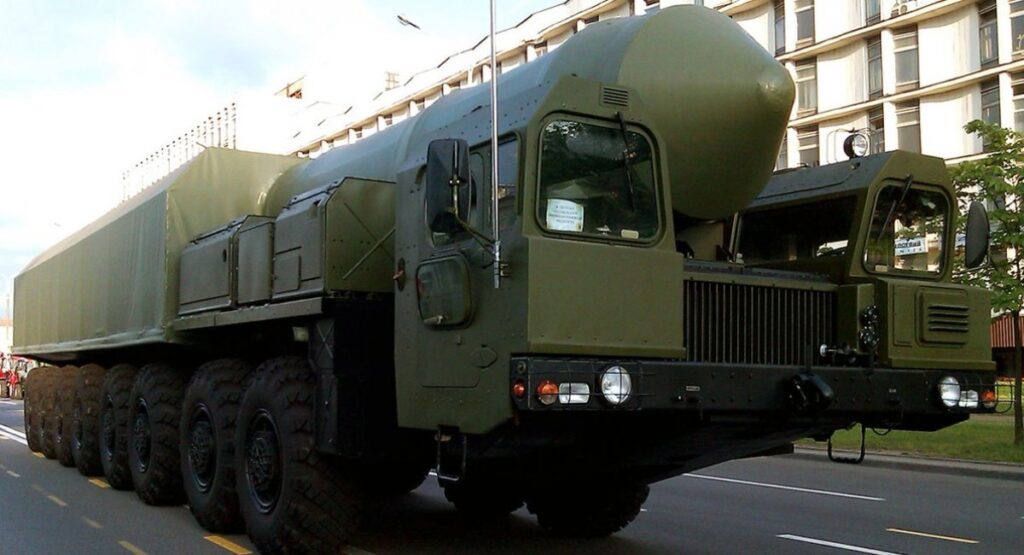ISW: Recent Russian missile strike shows no new nuclear threat
Russia showcased its missile capabilities with a strike on Dnipro using new ballistic missiles, alongside Putin's threats to the West, continuing Moscow's nuclear deterrence rhetoric.


The Institute for the Study of War (ISW) assesses that neither Russia’s recent Oreshnik ballistic missile strike on Ukraine nor President Vladimir Putin’s 21 November statement indicate any significant change in Russian strike capabilities or likelihood of using nuclear weapons.
Russian forces conducted a complex strike against critical infrastructure and industrial enterprises in Dnipro City, Dnipropetrovsk Oblast, on the morning of 21 November. The attack included a Kh-47M2 Kinzhal ballistic missile fired from Tambov Oblast, seven Kh-101 cruise missiles launched from Volgograd Oblast, and an experimental medium-range ballistic missile with reentry vehicles – likely a modified RS-26 “Rubezh” intermediate-range ballistic missile – fired from Astrakhan Oblast.
Ukrainian forces reportedly downed six Kh-101 cruise missiles, with the remaining missiles causing no significant damage. The strike damaged an unspecified industrial enterprise – ISW notes it’s likely Ukraine’s Pivdenmash factory that manufactures missiles and space rockets, a medical facility, and residential areas in Dnipro City, as well as residential areas in Kryvyi Rih, Dnipropetrovsk Oblast.
CNN: Russia breaks Cold War deterrence doctrine with multiple warhead missile strike on Dnipro
ISW cites Western officials who indicated that the ballistic missile targeting Dnipro City was not an intercontinental ballistic missile but more likely a shorter-range ballistic missile.
The think tank says that Putin gave an address on the evening of 21 November, claiming Russian forces conducted a combined missile strike against Dnipro City, including with a new “Oreshnik” non-nuclear ballistic missile. ISW notes that Putin framed the strike as a direct response to recent Ukrainian ATACMS and Storm Shadow strikes against military objects in Russia and alleged “aggressive actions” of NATO states against Russia.
However, ISW emphasizes that Russian forces routinely fire nuclear-capable Iskander ballistic missiles, Kinzhal hypersonic ballistic missiles, and nuclear-capable Kh-101 cruise missiles against Ukraine. The institute points out that previous Russian missile strikes have targeted industrial and critical infrastructure in Dnipro City that caused greater damage.
According to ISW’s assessment, the only fundamentally new characteristic of the Russian strikes against Dnipro City on 21 November was the Oreshnik missile itself, which ostentatiously showcased reentry vehicles to amplify the spectacle of the strike and further imply a nuclear threat.
“Neither the Oreshnik ballistic missile strike nor Putin’s November 21 statement represent a significant inflection in Russian strike capabilities or likeliness to use a nuclear weapon,” ISW wrote.
ISW cites US Central Intelligence Agency (CIA) Director Bill Burns, who in September 2024 cautioned Western policymakers against fearing Putin’s nuclear rhetoric, describing Putin as a “bully” who will “continue to saber rattle from time to time.”
Related:
- CNN: Russia breaks Cold War deterrence doctrine with multiple warhead missile strike on Dnipro
- Russian missile strike injures 15 people in Dnipro’s Kryvyi Rih, including teenagers
- Moscow’s first ICBM attack: Russia hits Dnipro with intercontinental ballistic missile injuring two
- Pentagon: No signs Russia preparing nuclear weapons use against Ukraine
- ISW reports Kremlin threats over US approval of Ukrainian ATACMS strikes inside Russia
- Chemical weapons watchdog finds prohibited CS tear gas use against Ukraine forces
- Mosfilm studio transfers its T-55, PT-76 tanks from 1950s to Russian army amid equipment shortage
- Russia’s Ukraine invasion endangers global order, warns NATO chief
- NATO won’t intercept Russian missiles over Ukraine, Polish army chief reiterates



